On July 9th, the 8th ZUFE Forum for Young and Middle-Aged Finance Scholars, with the theme of “”Fiscal Policy and Theoretical Innovation of Macro-economic Regulation with Chinese Characteristics”, was held on Xiasha Campus. This forum was held both online and offline, bringing together more than 130 experts and scholars, from universities and scientific research institutes.
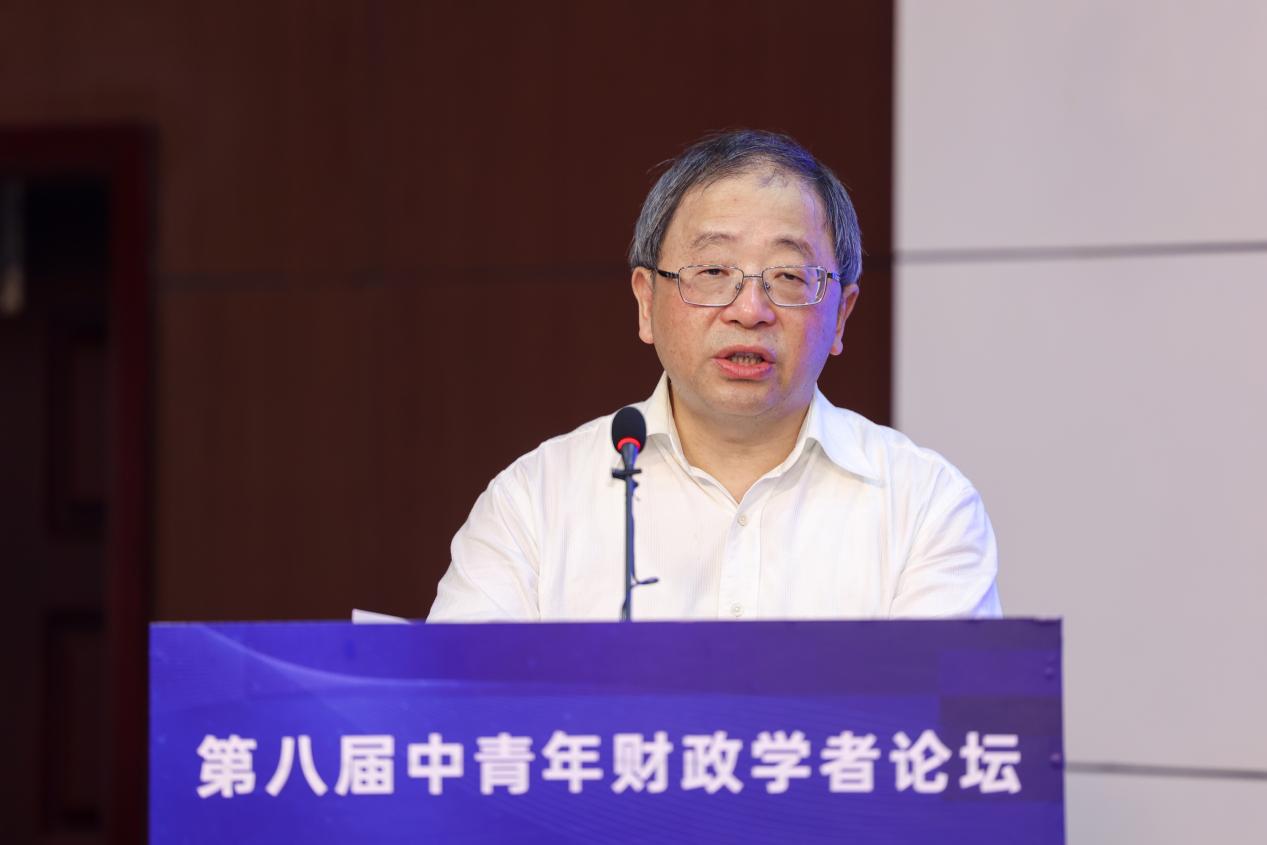
Zhong Xiaomin, president of ZUFE delivering a speech
Zhong Xiaomin, Deputy Party Secretary of the CPC ZUFE Committee and president of the university extended his sincere welcome to the guests, scholars, and experts present and expressed his heartfelt thanks to friends for caring about and supporting the development of ZUFE for a long time. He elaborated on the three aspects of "macroeconomic control policy", "macroeconomic control policy with Chinese characteristics" and "innovations on public finance study". He pointed out that there was no difference between China and western countries in that "finance serves the government" in both settings, the only difference lying in their governance. Adopting the governance philosophy of "putting people first", the Communist Party of China had a positioning of the finance function and an implementation mode of fiscal policies different from those of western countries. This also served as an institutional condition for the theoretical innovation of financial policies with Chinese characteristics. He hoped that young scholars could start from the practical work conducted by the Chinese authorities, conduct urgent and important research, and summarize and refine Chinese stories in a more simple and understandable way, making them replicable to build a discipline system, academic system, and discourse system with Chinese characteristics and Chinese style.
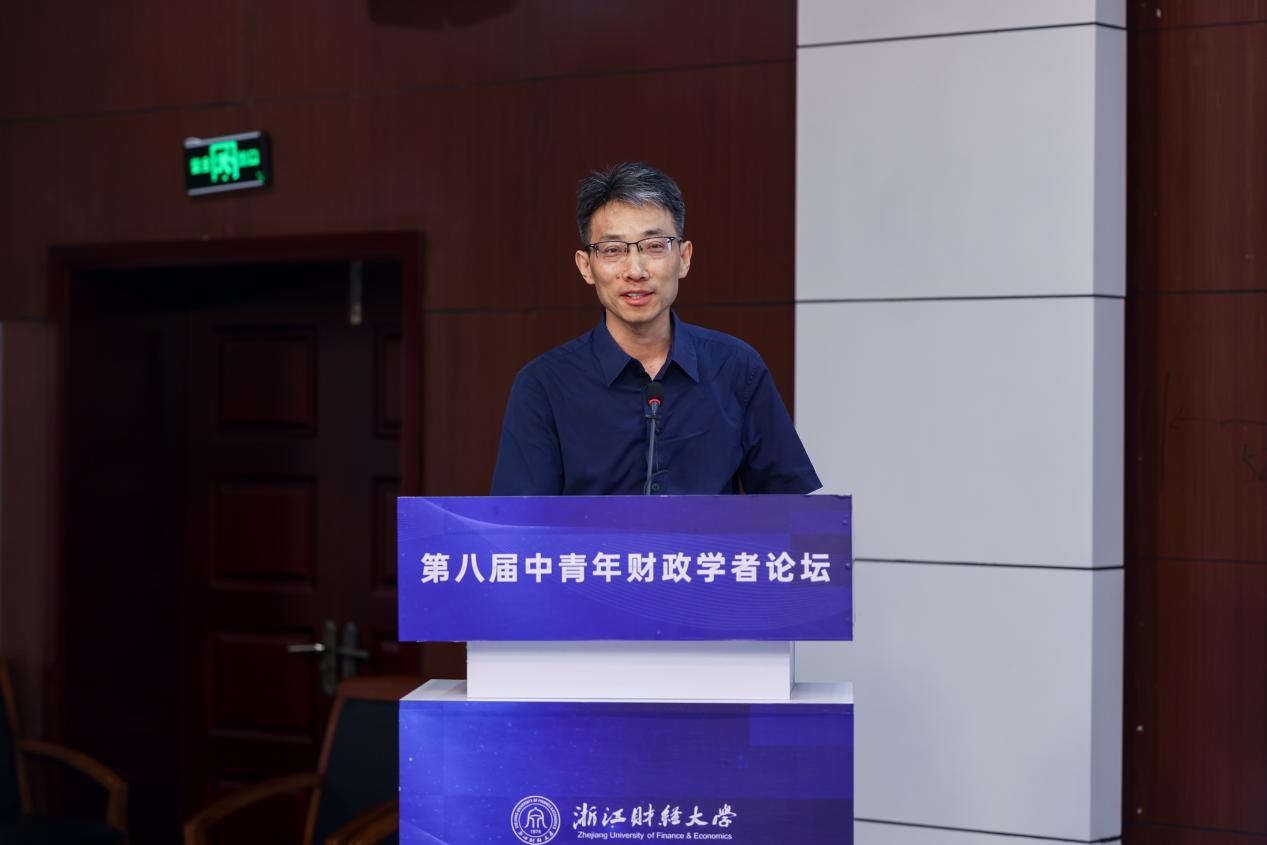
Professor Li Yongyou presiding over the keynote speech ceremony
Professor Li Yongyou, Deputy Director of the Academic Committee of ZUFE presided over the keynote speech ceremony. Liu Shangxi, President of the Chinese Academy of Fiscal Sciences, He Dexu, President of the National Academy of Economic Strategy, and Guo Wangqing, a professor from Renmin University of China delivered keynote speeches respectively.

Professor Liu Shangxi delivering a keynote speech
Professor Liu Shangxi delivered a speech themed "Fiscal Policies from a Risk Perspective". Liu pointed out that past studies on fiscal policies mainly started from an economic perspective and targeted demand and supply management. However, the study of fiscal policies from a risk perspective aims at minimizing public risks, whose scope was not limited to the economic dimension. According to the differences of subjects, risks could be divided into public, fiscal, and debt risks. Public risks were faced by the social community, fiscal risks by public subjects, and debt risks by civil subjects. By introducing the risk perspective, fundamental changes would occur in the policies’ basic logic. Thus, fiscal policies would be carried out in a way of risk hedging risk to minimize public risk. Besides, the effect of policies would be evaluated through risk convergence and risk diffusion. Overall risk convergence represented effective policies, while risk diffusion marked noneffective ones.
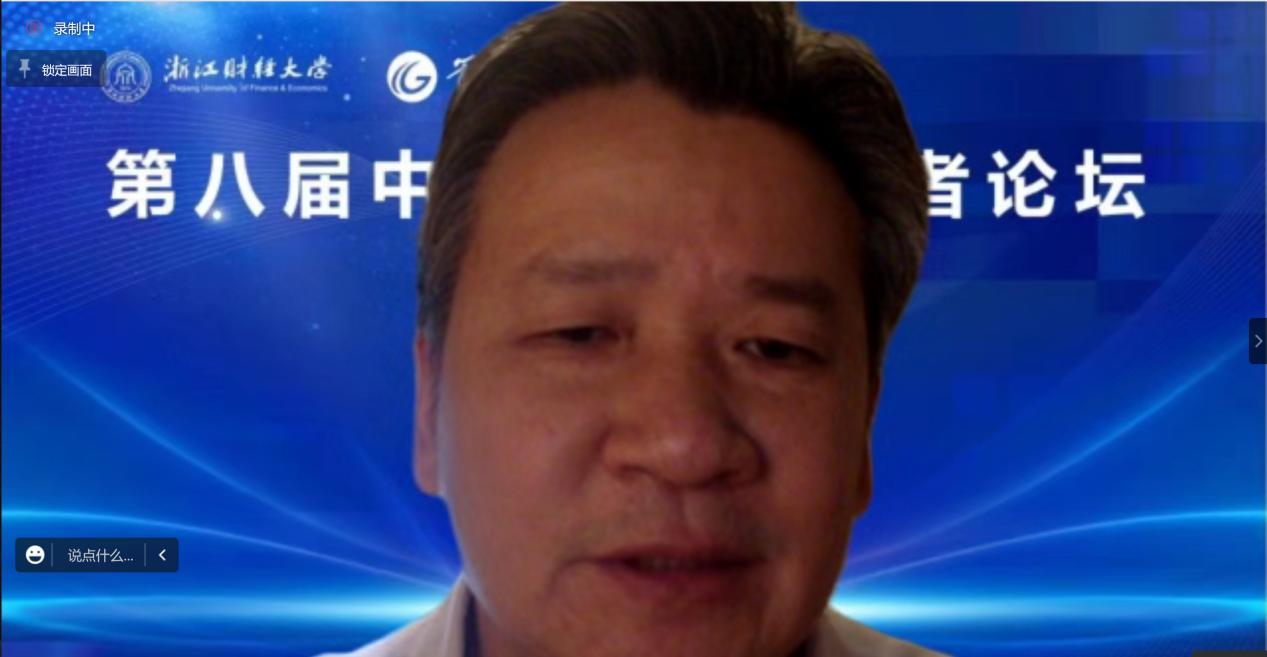
Professor He Dexu delivering a keynote speech
The theme of Professor He Dexu's speech was "Fiscal and Financial Coordination against a Complex Situation". He pointed out that under the current complex economic situation with increasing economic downward pressure, the use of fiscal policy or monetary policy alone could no longer effectively maintain economic stability. Thus, more attention should be paid to the coordination of fiscal and financial policies, especially in the areas of high-quality economic development, macro governance system, industrial regional policies, major economic and financial risks and crises, and employment.
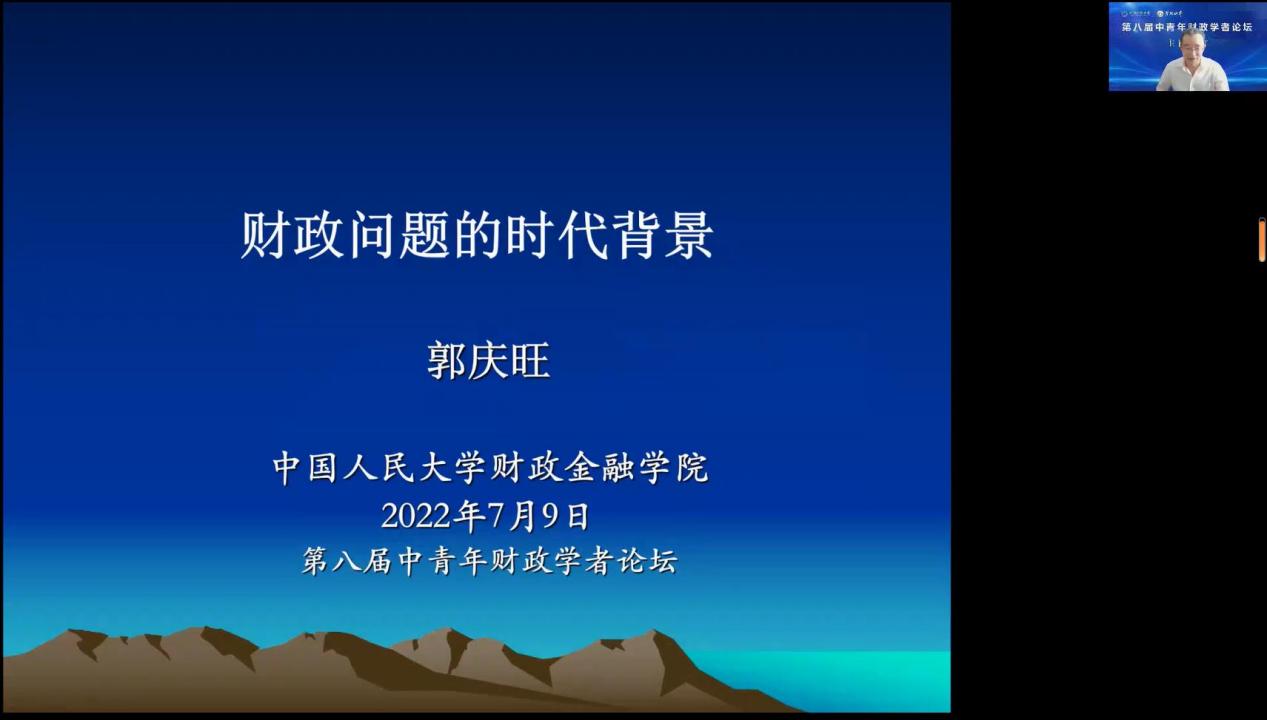
Professor Guo Qingwang delivering a keynote speech
Professor Guo Qingwang's speech was themed "Historical Background of Fiscal Issues". He said that we should accelerate the building of Chinese discourse and narrative systems. We should use Chinese theories to illustrate Chinese practice, and in turn, use Chinese practice to perfect Chinese theories. For example, a series of fiscal policies with Chinese characteristics including fiscal subsidies, non-budgetary funds, fiscal decentralization, active fiscal policies, investment and financing platforms, and land finance over the past four decades since the reform and opening up showed that many fiscal practices of our nation were unreasonable and not standard from the perspective of western theory. However, these practices met the need of specific periods of China’s development and achieved the objectives of national governance. All these indicated that different countries should adopt development paths in line with their own characteristics, and it was not necessary for all countries to follow the policy models of western countries.

Li Yifei, editor of Management World leading the round table discussion
There were two round table discussions during this forum. One was themed "Fiscal Policies and Economic Governance"which was hosted by Li Yifei, editor of Management World. Seven experts participated in the discussion including Fang Hongsheng, associate dean of the School of Economics of Zhejiang University, Gong Feng, Chairman of the Department of Public Finance and Taxation of Wuhan University, Jia Junxue, associate dean of the School of Finance of Renmin University of China, Mao Jie, associate dean of the School of International Trade and Economics of University of International Business and Economics, Miao Xiaolin, Dean of the School of Public Finance and Management of Yunan University of Finance and Economics, Xie Zhenfa, associate dean of the School of Economics of Xiamen University, and Zhu Jun, Dean of the School of Public Finance and Taxation of Nanjing University of Finance and Economics.

Professor Fang Hongsheng delivering a speech
Professor Fang Hongsheng delivered a speech themed "Macroeconomic Control with Chinese Characteristics: The Role of State-owned Enterprises (SOEs)". He illustrated the internal logic of the investment behaviors of China's SOEs with an expansion orientation and explained the countercyclical investment behavior of SOEs during economic recessions. He pointed out that we could proactively utilize SOEs investment as a tool for quasi-fiscal policies to facilitate economic stability and growth when the fiscal policies of the central and local governments were inadequate to stabilize the economy.
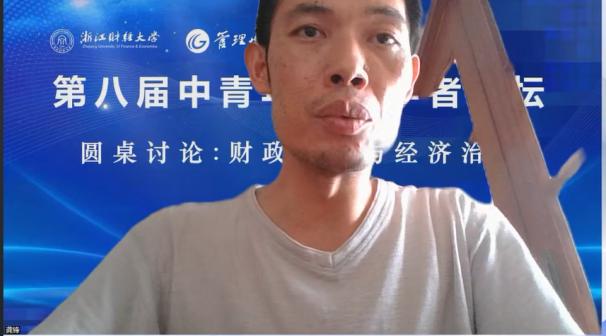
Professor Gong Feng delivering a speech
The topic of Professor Gong Feng's speech was "Prevention and Resolution of Local Hidden Debt Risks". At first, he gave an estimation on the scale of local hidden debt and, based on real cases, made a summary of his ideas and broke them into 6 measures for preventing and resolving hidden debt risks, including repayment of financial funds, disposal of assets, conversion to operating debt, debt restructuring, the government-led establishment of local credit guarantee funds, and disclosure of hidden debt. He advocated for the simultaneous prevention and resolution of local hidden debt risks in the short-term, medium-term, and long-term. In the short-term, attention should be paid to risk prevention and fundraising; in the medium-term, focuses should be on the reform of fiscal and taxation systems and control of debt increase fundamentally; in the long-term, attention should be paid to deepening reform and opening-up and reducing leverage ratio through high-quality economic development.
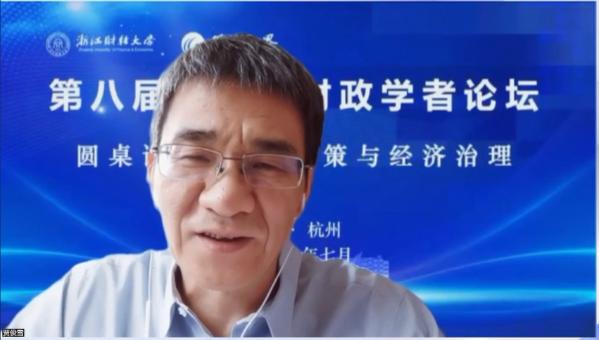
Professor Jia Junxue delivering a speech
Professor Jia Junxue gave a speech on the topic of "The Building of a Fiscal Policy System with Chinese Characteristics". He believed that the current fiscal policy transformation should take an appropriate increase in the deficit ratio as a positive signal, moderately increase government investment, promote tax and fee cuts and transfer payments, and hedge the downward pressure of the economy, the pressure from difficulties met by enterprises and the pressure faced by grassroot-level governmental organs in terms of the "three guarantees" (basic livelihood, wages, and operating expenses). He also gave a profound analysis of the logic of Chinese fiscal policies in three aspects, including institutional logic, governance logic, and theoretical logic. Moreover, he proposed that the target for the building of a fiscal policy system in the new stage of development was the coordination of development and security to ensure the effective implementation of substantive tax and fee reduction policies and play the policy effect in a better way, and ensure sustainable finance.
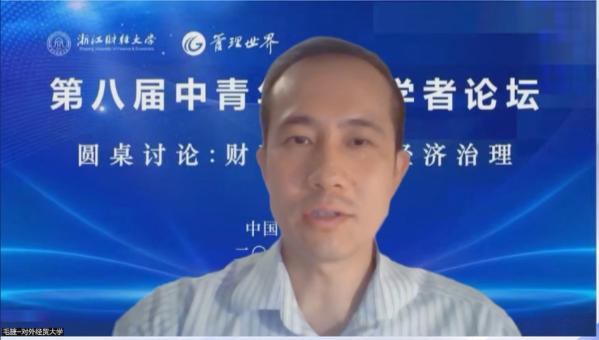
Professor Mao Jie delivering a speech
Professor Mao Jie gave a speech themed "Study Progress and Prospect of Local Government Debt in China". He reviewed studies on China's local debt over the past few years based on the composition and classification of local debt, debt scale measurement, international comparison, formation mechanism, and economic effect. He held that future studies on local debt should focus on the following points: first, the theoretical system of local government debt should keep pace with the times; second, the economic effect of local debt would change with the change of constraints and development; third, more studies should be conducted from the perspective of combining public finance and finance.

Professor Miao Xiaolin delivering a speech
Professor Miao Xiaolin delivered a speech themed "Proactive Fiscal Policies in Line with High-quality Economic Development—Since the 18th CPC National Congress". He pointed out that since the 18th National Congress of the CPC, the purpose of proactive fiscal policies has changed from a traditional one centered around economic recovery and growth into a modern and sustainable one aimed at high-quality economic development. Modern proactive fiscal policies should be people-centered and reshape the economic operation framework, re-interpret the connotation of "proactive", and appropriately handle the revenue-expenditure-debt relationship.

Professor Xie Zhenfa delivering a speech
Professor Xie Zhenfa made a speech on the topic of "Common Prosperity, Regional Development Strategy and Public Finance and Taxation Policies". He said that attention should be paid to studies on the effect of major regional development strategies in promoting internal coordinated development within regions and common prosperity. Studies showed that the strategy to develop the western regions of China significantly narrowed the gap in economic development within the western regions and achieved a more balanced development within regions by increasing infrastructure investment and promoting regional trade.
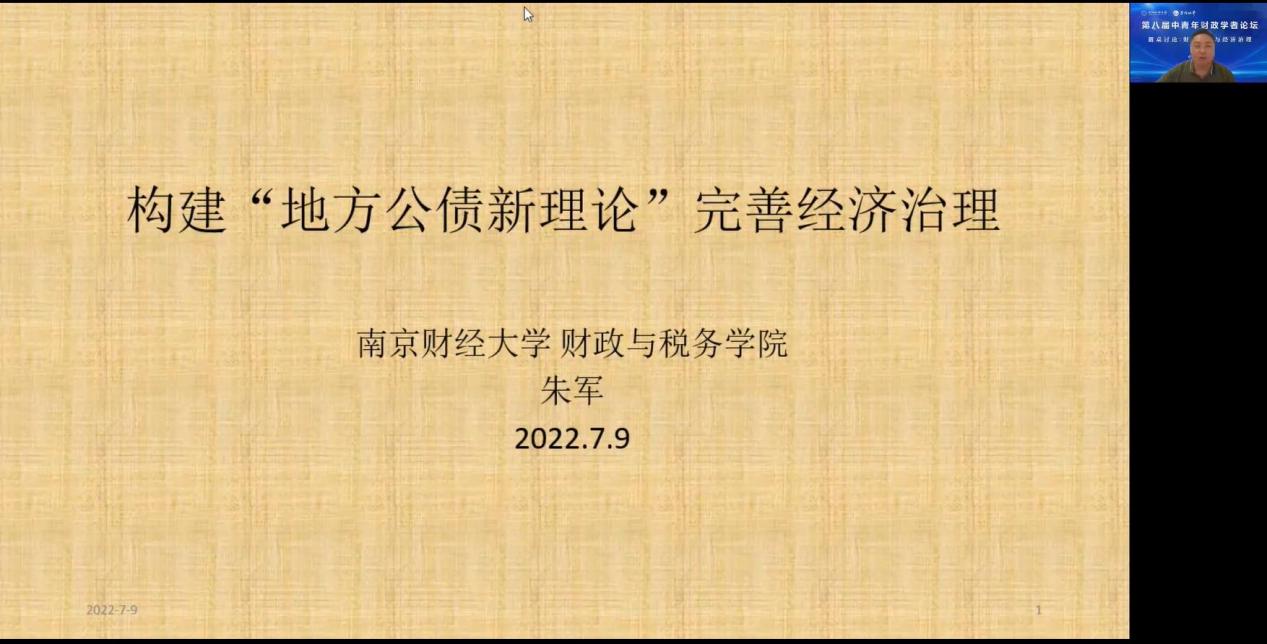
Professor Zhu Jun delivering a speech
Professor Zhu Jun delivered a speech themed "Building 'New Local Government Bond Theory', Improving Economic Governance". He said that in practice local government bonds in China had the characteristics of timely adjustment and timely response, which reflected the theoretical characteristics of dynamic evolution, and formed the theoretical rules of government bonds -- "setting rules and ceilings, improving efficiency, and breaking rigidity". Additionally, standardized financing and non-standardized financing modes developed in harmony.

Chen Shuangzhuan, deputy director of the Editorial Department of Taxation Research, presiding over the roundtable discussion
Themed "Tax Policy and Economic Governance", the second roundtable discussion was hosted by Chen Shuangzhuan, deputy director of the Editorial Department of Taxation Research. Seven experts joined the discussion and exchanged ideas including Bai Yanfeng, Dean of the School of Public Finance and Taxation of Central University of Finance and Economics, Chu Deyin, Dean of the School of Public Finance and Public Management of Anhui University of Finance and Economics, Li Jianjun, associate dean of the School of Public Finance and Taxation of Southwestern University of Finance and Economics, Liu Yi, Chairman of the Department of Public Finance of Peking University, Wang Weitong, Dean of the School of Economics of Dongbei University of Finance and Economics, Wu Hong, deputy director of the Research Center of Finance and Taxation of Jiangxi University of Finance and Economics, and Zhang Kezhong, Dean of the School of Public Finance and Taxation of Zhongnan University of Economics and Law.
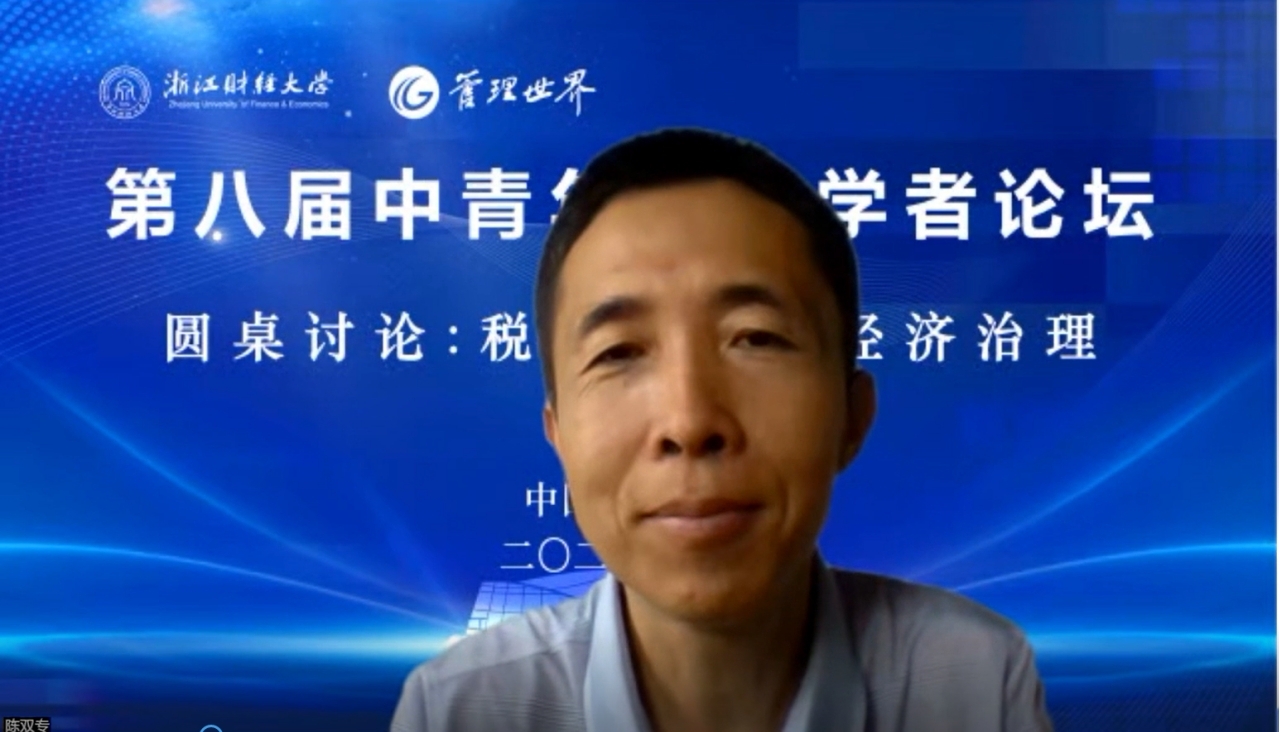
Professor Bai Yanfeng delivering a speech
Professor Bai Yanfeng made a speech themed "Low-tax-rate Places: Typology, Cause and Value Judgement". He pointed out that the "low-tax-rate places" still existed in some regions and industries in a more or less apparent manner. In the past, they existed in leading industries like manufacturing, while now they rely on marketing programs like online platforms. Low-tax-rate places reflect the increasing competition among local governments and their aspiration for economic growth. We need to carefully think about the issue and regulate "low-tax-rate places" while growing.
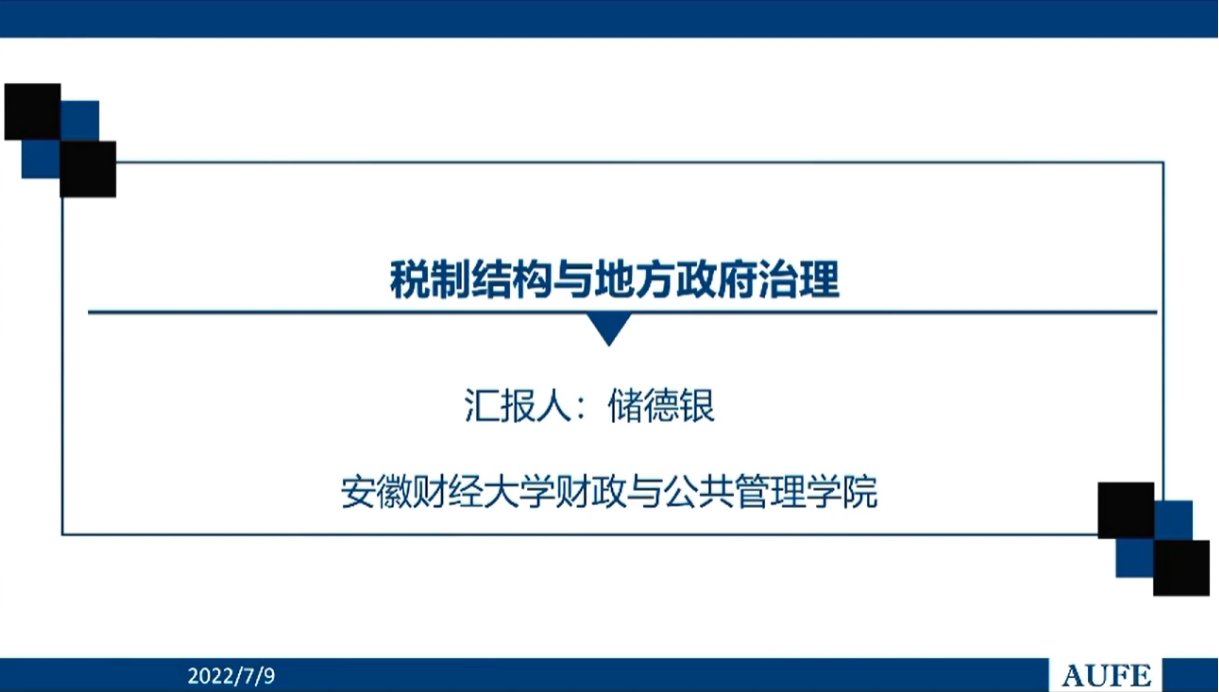
Professor Chu Deyin delivering a speech
Professor Chu Deyin delivered a speech titled "Structural Upgrading of Taxation System and Local Government Governance". Based on the report of the 19th National Congress of the CPC, he believed that the tax system was a vital part of the fiscal system, and its structural upgrading could facilitate the building of a modern fiscal system and improve the governance capacity of the government. Theoretical and empirical analyses showed that compared with indirect taxes, direct taxes could better improve the local governance capacity, and the same went for personal income tax as compared with enterprise income tax.
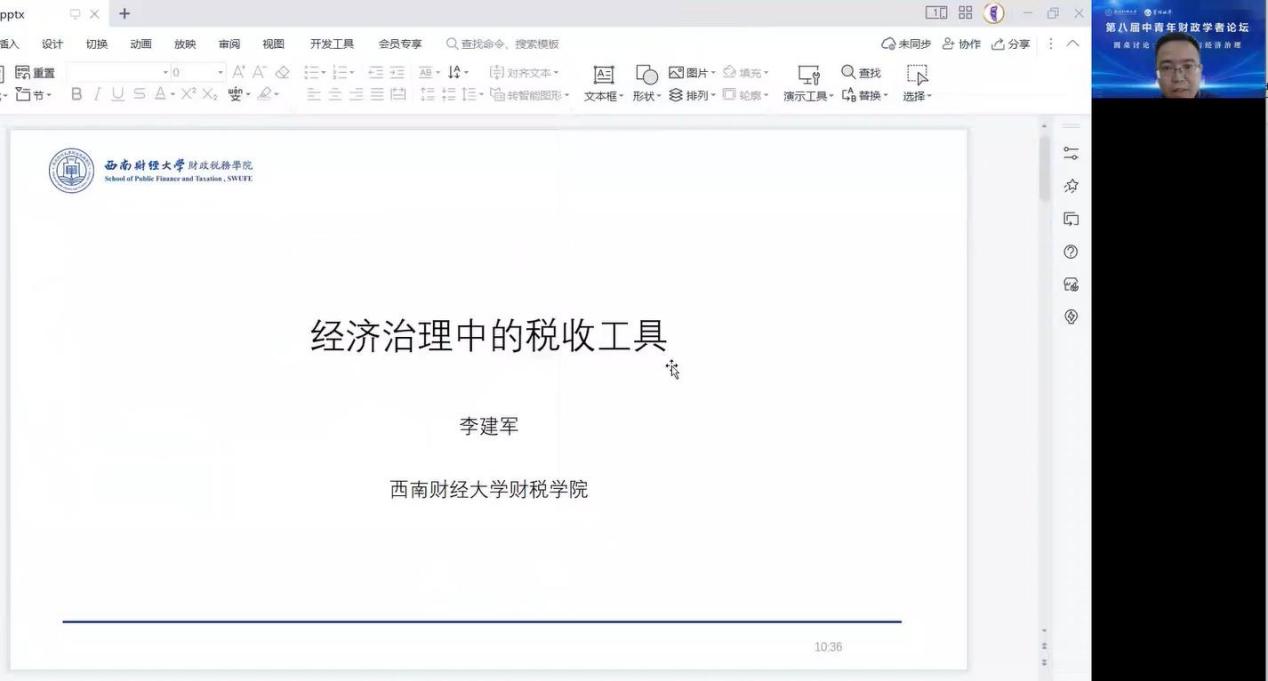
Professor Li Jianjun delivering a speech
Professor Li Jianjun gave a speech themed "Tax Tools in Economic Governance". He said that since taxation was the basis and an important pillar of economic governance and the capability and ways of taxation were closely related to national prosperity, we should build a sound tax system based on moderate tax rates, improve substantive, administrative, and institutional taxation tools so that we could achieve good governance through proper taxation.
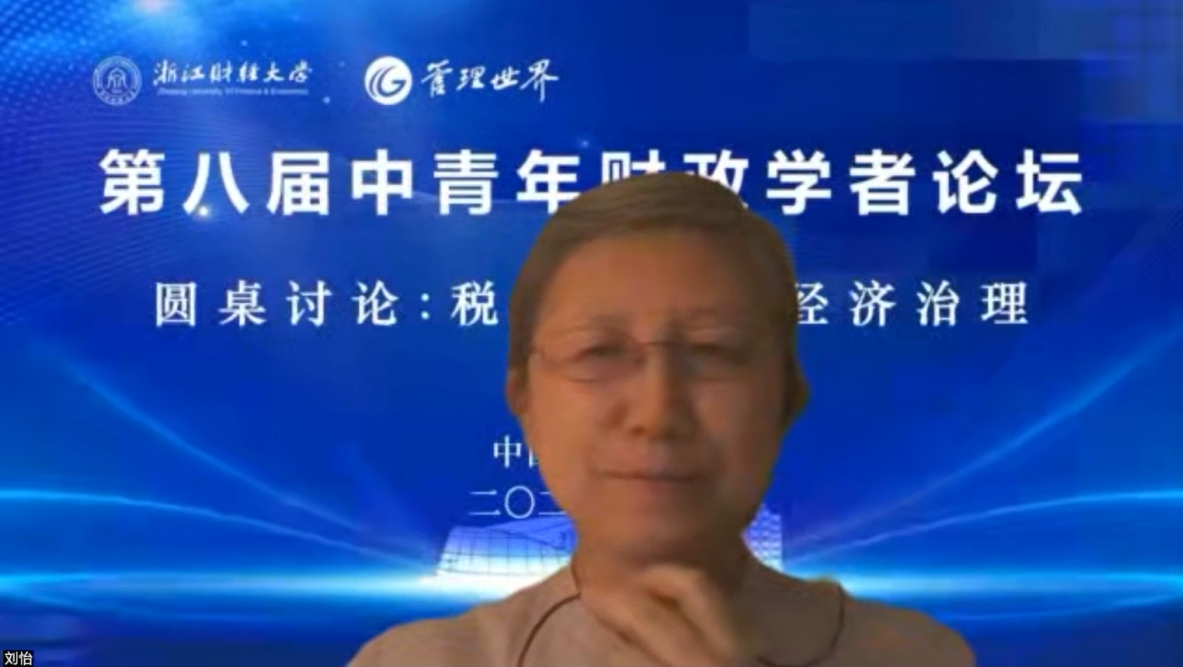
Professor Liu Yi delivering a speech
Professor Liu Yi gave a speech with the theme of "A Unified Large Market and an Inter-regional Tax Sharing System". She put forward the question of how to release consumption potential and the issue of a unified large market by citing the State Council’s policy to boost consumption. She pointed out that the inconsistency between our industrial structure and industrial tax structure was derived from the fact that commodity tax was paid at places of production and that the income tax settlement framework was not clearly defined. The digital economy further strengthened production concentration, and it was necessary to think over the inter-regional sharing principle of commodity tax and income tax. In particular, the coordination between the place of production principle and the place of consumption principle should be fully considered for value-added tax.

Professor Wang Weitong delivering a speech
Professor Wang Weitong delivered a speech themed "Some Thoughts on Tax Reduction Policies for Micro and Small Enterprises (MSEs)". He believed that tax cuts and fee reductions were essential to the response to downward economic pressure and the COVID-19 epidemic. Also, as MSEs were the important basis for our economy, it was necessary to focus on tax cut for them. His team found that tax manipulation existed in MSEs in general. Tax cut policies indeed reduced the tax burden for MSEs and entrepreneurs and employees all benefited from them. Simultaneously, there was a paradox: tax cut remained at a large scale, while tax cut policies brought a weak sense of fulfillment to enterprises at best. This was closely related to the unregulated development of the bookkeeping agency industry providing tax intermediary service for MSEs. They also found that further regulation of the service level of bookkeeping agencies would help to optimize the tax-payment behavior of MSEs.
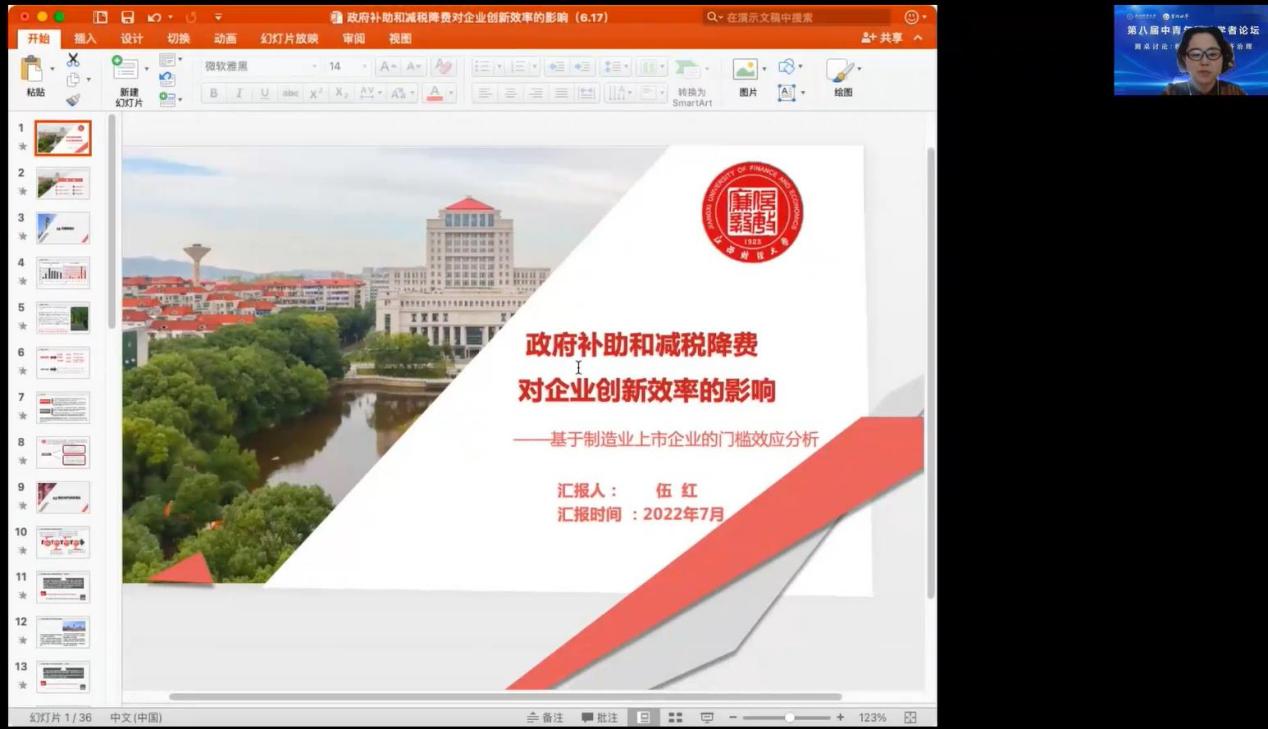
Professor Wu Hong delivering a speech
Professor Wu Hong delivered a speech on the topic of "The Impact of Government Subsidies, Tax Cut and Fee Reduction on Enterprise Innovation Efficiency". According to her study, increasing government subsidies and reducing the actual tax-burden for enterprises could boost the innovation efficiency of manufacturing enterprises. Moreover, government subsidies had a threshold effect. Therefore, she proposed a series of suggestions.

Professor Zhang Kezhong delivering a speech
Professor Zhang Kezhong gave a speech themed "Return of Financial Aid: Experience and Proof of China's Financial Participation in Global Governance". From the new perspective of return of aid, he analyzed the benefits of foreign financial aid. According to his study, China’s foreign financial aid promoted export and investment by establishing a good national image and would help to improve the political bargaining power of our country.
There were six sub-forums. Experts and scholars at this conference conducted lively discussions and exchanges on topics such as "Macro-economic Policy Coordination", "Regional Public Finance Coordination", "Management of Fiscal Expenditure Policies", "Design of Tax System and Taxation Policies", "Modernization of Fiscal and Tax Management", and "Public Finance and Taxation policies and Green Development".
Six excellent papers stood out during the forum. Of them. The article "Independent Auditing and Quality of Supervision" won the first prize. The second prize went to "Profit Transfer of Foreign Direct Investment Companies, Corporate Control and Tax Base Security" and "Financial Incentives, Inter-regional Cooperation, and Regional Economic Integration". Additionally, the third prize was conferred to "From Single Peak to Double Peaks--China’s Great Transformation of Financial Expenditure Structure from 1953 to 2019", "Environmental Regulation, Corporate Inter-regional Investment, and Green Transition and Upgrading" and "Coordination between Government Bond Issuance, Short-term Liquidity Shock and Monetary Policy".

First sponsored by ZUFE in 2015, this forum aims to provide an advanced, in-depth, and interdisciplinary academic exchange platform for young and middle-aged finance scholars both at home and abroad to broaden their academic horizons and inspire their academic thinking. Based on the Chinese experience, it always upholds the principle of advancing exchanges among scholars and pursuing an academic spirit of freedom and openness, rigor and truth-seeking, and cooperation and sharing, by encouraging young and middle-aged scholars to explore the modernization path of China’s financial system.
